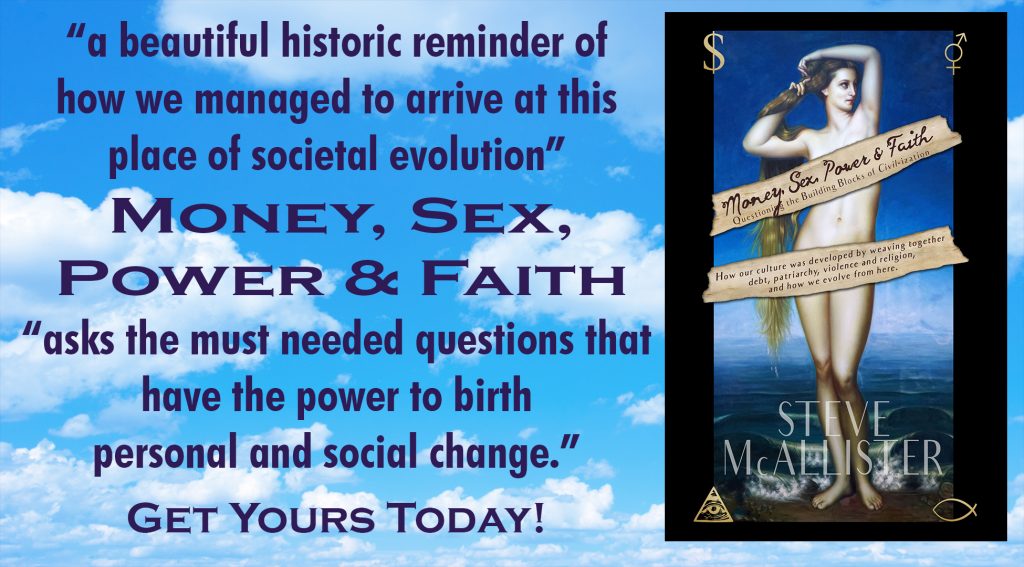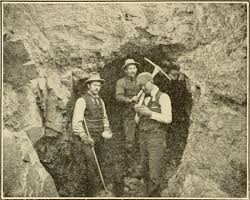The following is a chapter from Money, Sex, Power & Faith.
Order your copy in paperback or for Kindle!
“Capitalism is the astounding belief that the most wickedest of men
will do the most wickedest of things for the greatest good of everyone.”
– John Maynard Keynes
Just as the New World colonists were celebrating their revolution after not being allowed to print their own money, a Scotsman named Adam Smith released a book extolling the virtues of paper money, industrialization, and all of the other wonderful things that capitalism had to offer. Originally titled An Inquiry into the Nature and Causes of the Wealth of Nations, the wordy title, which was quite adequate for a book with over 900 pages, was quickly shortened to just The Wealth of Nations. The book sparked an overwhelming embrace of capitalism, adding fuel to the fire of industrialism.
Smith viewed capital as “that part of a man’s stock which he expects to afford him revenue,” and the movement he inspired viewed capital as more than merely land and goods, but labor as well. Downplaying corporate power, Smith felt private entrepreneurship was much more effective at growing an economy due to man’s ingrained self-interest. Although he mentioned it only three times in his two books, his theory of an “invisible hand” which guides society toward progress as individuals seek their personal ambitions, served to shift the faith of the people from the freedom proffered by religious doctrine to the doctrine of the free market.
“Nobody ever saw a dog make a fair and deliberate exchange of one bone for another with another dog,” Smith wrote in The Wealth of Nations. “Nobody ever saw one animal by its gestures and natural cries signify to another, this is mine, that yours; I am willing to give this for that… But man has almost constant occasion for the help of his brethren, and it is in vain for him to expect it from their benevolence only. He will be more likely to prevail if he can interest their self-love in his favour, and show them that it is for their own advantage to do for him what he requires of them. Whoever offers to another a bargain of any kind, proposes to do this. Give me that which I want, and you shall have this which you want, is the meaning of every such offer; and it is in this manner that we obtain from one another the far greater part of those good offices which we stand in need of.”
As the Church had already begun to splinter from Roman Catholicism into Calvinism, Anglicanism, Puritanism, and a boatload of other “isms,” Smith, while citing God a number of times, offered a philosophy which regarded humanity with much more regard than the concepts of “natural sin” born in early Christianity or the “utter depravity” of humans described by the Calvinist faction. Smith believed the goodness of man could win the day through the practice of capitalism and a free market, citing the commercial virtues of prudence, justice, frugality, and industry, which worked in concert with the noble virtues of generosity, gratitude, compassion, and love, to expand the overall well-being of society. Ultimately, through The Wealth of Nations and his previous book, The Theory of Moral Sentiments, Smith was quite optimistic about man’s ability to control himself.
“The natural effort of every individual to better his own condition, when suffered to exert itself with freedom and security, is so powerful a principle, that it is alone, and without any assistance, not only capable of carrying on the society to wealth and prosperity, but of surmounting a hundred impertinent obstructions with which the folly of human laws too often encumbers its operations.”
Yet just as the foundations of our independence were built upon the rights of life, liberty, and the pursuit of happiness, Smith championed a movement of people having the freedom to tend to their affairs and build their own foundation on their own hard work, talent, and dedication.
As such, he was an ardent critic of monopolies and large corporations, stating, “The directors of such [joint-stock] companies, however, being the managers rather of other people’s money than of their own, it cannot well be expected, that they should watch over it with the same anxious vigilance with which the partners in a private copartnery frequently watch over their own… Negligence and profusion, therefore, must always prevail, more or less, in the management of the affairs of such a company.”
Smith was a champion for those who had sought a new life free from the tyranny of kingdoms and the ability to manifest their own destinies with their own two hands. Although he wrote the book in England, he spoke straight to the hearts of those in the New World who were following the mandate to populate the earth. “A man must always live by his work, and his wages must at least be sufficient to maintain him. They must even upon most occasions be somewhat more; otherwise it would be impossible for him to bring up a family, and the race of such workmen could not last beyond the first generation… The most decisive mark of the prosperity of any country is the increase of the number of its inhabitants.”
Yet with Smith’s grand vision and its invisible guiding hand, he also saw the inherent flaws in the free market and was able to offer little true guidance on how to rectify them. “Wherever there is great property, there is great inequality,” Smith wrote. “For one very rich man there must be at least five hundred poor, and the affluence of the few supposes the indigence of the many. The affluence of the rich excites the indignation of the poor, who are often both driven by want, and prompted by envy, to invade his possessions.”
Some have debated whether or not self-interest and public-interest are congruous, resulting in what German scholars have come to call “Das Adam Smith Problem.” Given the way in which wealth has since been largely consolidated into the hands of a very small, self-interested percentage of the population, it does seem that Smith’s theory may have some flaws. Or perhaps 900 pages were still not quite enough to fully explain the situation. Nevertheless, although Smith has been given the title of “father of modern economics,” the version of capitalism practiced in 2018 is a far cry from what its father had envisioned for his offspring, largely because some of the most powerful tenets, and his greatest warnings, have since been ignored.
“As soon as the land of any country has all become private property,” wrote Smith, “the landlords, like all other men, love to reap where they never sowed, and demand a rent even for its natural produce. The wood of the forest, the grass of the field, and all the natural fruits of the earth, which, when land was in common, cost the labourer only the trouble of gathering them, come, even to him, to have an additional price fixed upon them. He must then pay for the license to gather them, and must give up to the landlord a portion of what his labour either collects or produces.”
Given what the American colonists had endured through the taxation of the British government and the chartered corporations that had imposed such harsh limitations over the years, and the egalitarianism that had been promoted through the solidarity of working together to defeat a common enemy, Smith’s words resonated throughout early America, as they were trepidatious about trusting the voracious appetites of corporations.
At the time, the top 1% of the population held about 9% of the nation’s wealth, while the top 1% in England held over 17% of the wealth, making early America one of the most egalitarian places on the planet. As such, it was ripe for a new construct beyond the limitations of mere mercantilism and an economy based on scarcity.
Smith’s view of capitalism sought to encourage this type of egalitarianism through the practice of competition without government interference. He believed in the inherent goodness of people to master their virtues and overcome the temptation of greed and selfishness by considering the common good. Holding private property in great esteem, Smith’s assertion was that everyone, both rich and poor, could use their private property as capital to create a better life for themselves. As wary of corporate power as the American colonists were, Smith felt that one of government’s primary roles was to prevent monopolies from distorting the market by the accumulation of wealth and limiting free trade. Yet he was also aware of its ingrained inability to do so.
“Civil government, so far as it is instituted for the security of property,” he wrote, “is in reality instituted for the defense of the rich against the poor, or of those who have some property against those who have none at all.”
For the largely agrarian society of farmers and craftsmen, income equality was of the utmost importance. Unfortunately, somewhere along the way, something went horribly wrong.
Order your copy of Money, Sex, Power & Faith today!


